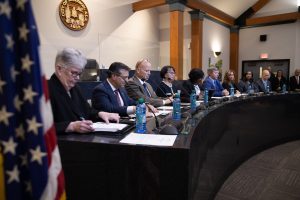General Fund plan advances in House; most other bills on hold
MONTGOMERY — A House committee Wednesday approved the Senate-passed $2.38 billion General Fund budget, putting it and the $7.3 billion education budget in line for final passage by Saturday.
House leadership on Wednesday afternoon said it will not take up bills that aren’t directly tied to the budgets or specific to members’ districts, effectively killing some senators’ proposed legislation.
“At the end of the day, we decided we’re going to stick with the original agreement and there would be no other bills worked on or passed,” House Speaker Mac McCutcheon, R-Monrovia, told reporters.
All other bills will have to be taken up during a special session at the call of Gov. Kay Ivey.
On the Senate floor Wednesday morning, Senate President Pro Tem Del Marsh, R-Anniston, said leadership had agreed to limit the scope of final days of the session that was delayed and shortened by the coronavirus outbreak. He also pointed out that several of the bills pending in the Senate were related to the budgets or the pandemic.
Wednesday afternoon, Marsh said not taking up the additional bills was appropriate, given the social distancing constraints on the 105-member House and the fact that most House Democrats have chosen not to attend the final days of the session.
“(McCutcheon has) got challenges that we don’t have to deal with in the Senate,” Marsh said during a phone interview.
Budget changes
A few supplemental appropriations were also passed in the committee, including $600 million from federal CARES Act funding that Ivey can use immediately for COVID-19-related expenses.
House Ways and Means General Fund Chairman Rep. Steve Clouse, R-Ozark, said the $600 million supplement can go toward things like medical equipment or helping hospitals, but he wasn’t sure if it can be used to help small businesses.
“We’ll hopefully get more guidance from Washington in the next weeks or months to give us a clear understanding of what this money can’t and can be spent for,” Clouse said.
The state has received more than $1.7 billion from the federal government from the CARES Act relief package passed by Congress in March. According to the Treasury Department, the funds must be spent on outbreak related expenses and cannot go to replace lost revenue.
The Senate had allocated $100 million in CARES funding for Ivey’s immediate use. Senate General Fund committee chairman Sen. Greg Albritton, R-Range, said there will be discussions about the amount when the General Fund comes back to the Senate.
“I’d like to know what that money is being spent on, how it’s being used,” Albritton said. “We’re the ones who have to account for it.”
Clouse said any additional appropriations of the CARES Act funding would have to be taken up in a special session.
The bare-bones General Fund totaling $2.389 billion includes modest increases for mental health, Medicaid, public health and state prisons but does not include a state employee pay raise. The fiscal 2021 budget pays for non-education state agencies and services and contains $167 million more than the current year’s budget.
No Democrats on the committee were in attendance Wednesday, keeping with a caucus pledge last week to sit out the rest of the session over coronavirus health concerns. Democrats and Ivey have said the budgets should be passed later in the year when better information about the virus’s impact on state revenues is known.
Ivey must sign the budgets before they take effect.
Thursday the House is expected to take up both the General Fund and the $7.2 billion education budget. The education budget would still need Senate approval, which could happen as early as Saturday. The Senate would also need to approve any House changes to the General Fund.
The House committee approved an amendment that would add money back to the state auditor’s office, increasing it from the Senate-passed $500,000 to $853,172.
The auditor’s office reports to the governor receipts and disbursement of revenues collected and paid into the treasury. It’s also responsible for the accounting of state property costing $500 or more.
Clouse said the Senate members’ problems with State Auditor Jim Zeigler shouldn’t keep the Legislature from funding what is necessary for that office to fulfill its duties.
“I think at the end of the day (Zeigler) has a lot of good employees that work for that office that do the job they’re supposed to do by keeping track of the different equipment in state offices around the state, and they need to be supported,” Clouse said.
Early in the session, a proposed constitutional amendment was filed in the Senate to abolish the office and move its responsibilities to the Alabama Examiners of Public Accounts Department. The bill did not get a floor vote in the Senate before the coronavirus shortened and altered the focus of the session.
The committee also approved a supplemental appropriation of $4.5 million for district attorneys.
Various district attorneys offices across the state have said they are worried about funding their offices because of a lack of court fee and fine collections, their primary funding source, due to the pandemic.
















